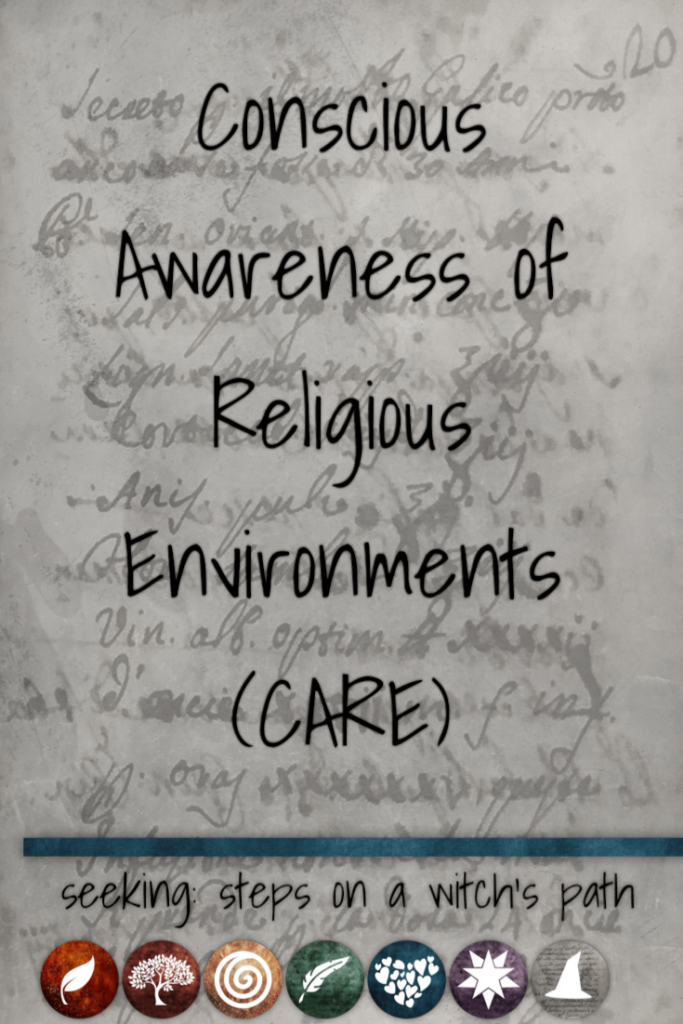Once upon the time, there was a web document called the CASHI (the Coven Abuse Self-Help Index) that was designed to help people evaluate Pagan and magical groups for problematic behaviors.
While my own experiences with groups have generally been very good, I feel the loss of something like the CASHI, and so wanted to create something that provided the same kind of in-depth discussion and commentary of relevant issues.
The word CARE is chosen to emphasize the importance of making conscious choices about where we spend our time and energy. There are three versions (described below) to allow you to pick the degree of detail you’d like to consider.

How this works
1) Think, observe, work from balance.
Engage your brain and your observation.
No one else can make these choices for you. You are also the one observing the group – you know best what you see, feel and experience when you’re around them. You may wish to take notes after each event while you’re getting to know a group and periodically afterwards.
Make sure that when you make these evaluations, you are coming from a place of balance yourself. If you’re exhausted, upset, have been skipping meals, or are worried about other major events in your life, you may react to otherwise pretty reasonable events in a way that’s not great for your long-term goals. It’s usually best to evaluate a long-term non-crisis situation when you’re well-rested, have had meal that makes your body feel good, and are reasonably relaxed.
Likewise, if you’re having issues with a group, it’s always good to try asking about them first. You may or may not get a helpful answer, but at least you’ll know you tried. In many cases, there may be a perfectly good explanation for why something is done a certain way, and they just haven’t explained it. (Perhaps because it hasn’t come up, or time has been limited, or they have been focusing on other questions.)
2) Be realistic.
Use these questions to help you explore possible concerns.
Wonderful, healthy, productive groups won’t meet the ideal in all areas. This list also can’t take individual circumstances into account: there may be good reasons for a particular choice or decision. And, of course, not all issues are equally serious: threats and direct pressure to do something are much more of a concern than a group that has trouble getting started on time.
Make a list of any questions asked below that concern you. If you have significant questions in 3 or more broad topics, be cautious. If you have questions in 6 or more areas, you should be very careful – this suggests there may be serious concerns with the group.
3) Learn over time.
Many of the questions asked in this essay will come up naturally as you spend time with a group and hear individuals talk about their lives.
You’ll learn many of these things through your first 3-5 visits with a group but you may also need a more focused conversation if you have particular questions, since those early conversations will also cover a lot of other topics.
It’s also easy to behave well when things are going well. It’s harder to behave well when things are harder. You may find that a group is great for a long time. Then, a crisis comes up, the membership shifts suddenly, or something else may happen, and you find that problems start coming up. This is a good time to re-evaluate – and to speak up if you see things that concern you.
4) Practical details:
Not all questions will apply to all kinds of groups. Ignore the stuff that’s not relevant. For example, I refer to “groups” and “leaders” – you’ll need to adjust this for groups that are consensus run. And, of course, groups change and develop over time. Come back and revisit this list periodically. It’s worth checking in every 6 to 12 months to make sure a group is both still healthy and functional – and that it’s doing the things you want and need.
Two versions:
Since people have different needs and want different levels of detail, we have different options. You may also wish to use them at different stages – for example, the simple questions when you first meet a group or teacher, and then the deeper questions.
1) A simple list of basic questions:
This page has a list of general questions. Easy, simple, a good place to start and review.
2) Deeper questions:
Specific focused questions on a number of topics – everything from “How does this person treat others” to ritual practices. It also includes links to even deeper information in the commentary

Last edited December 26, 2016. Reformatted November 2020.



